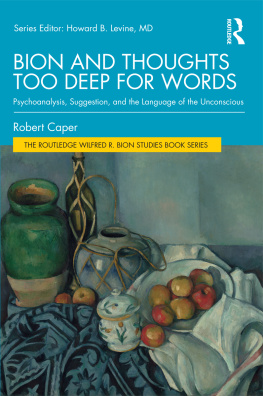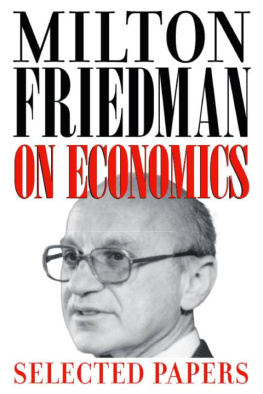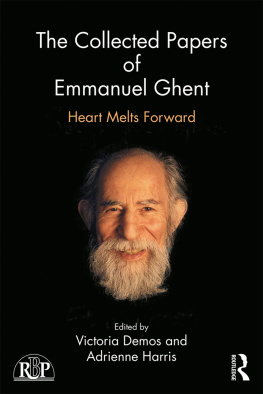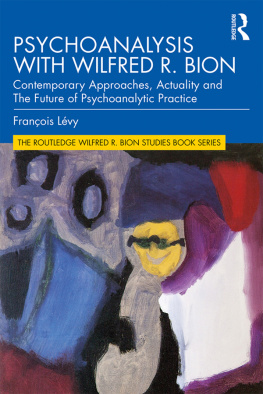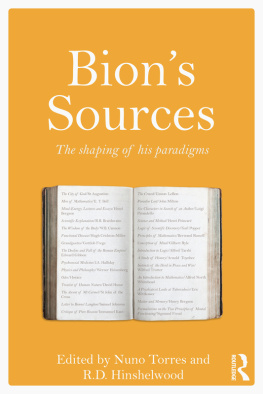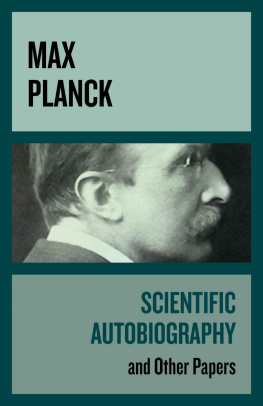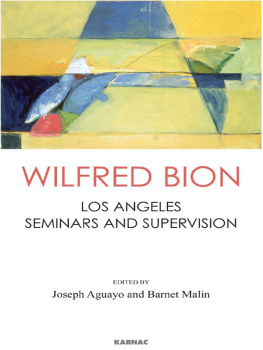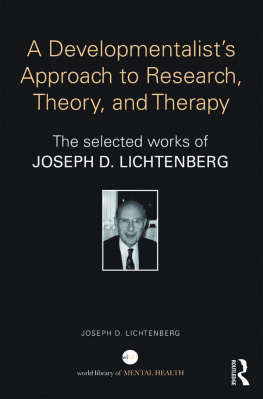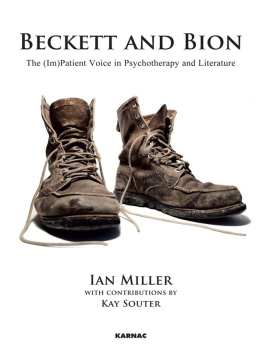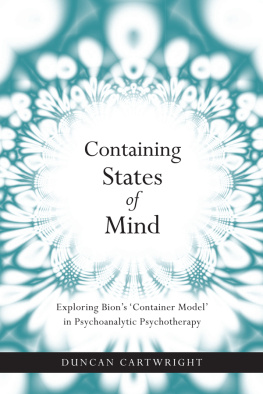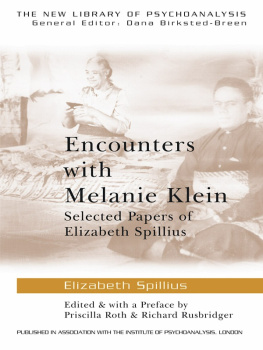Wilfred R. Bion - Second Thoughts: Selected Papers on Psychoanalysis
Here you can read online Wilfred R. Bion - Second Thoughts: Selected Papers on Psychoanalysis full text of the book (entire story) in english for free. Download pdf and epub, get meaning, cover and reviews about this ebook. year: 1984, publisher: Karnac Books, genre: Detective and thriller. Description of the work, (preface) as well as reviews are available. Best literature library LitArk.com created for fans of good reading and offers a wide selection of genres:
Romance novel
Science fiction
Adventure
Detective
Science
History
Home and family
Prose
Art
Politics
Computer
Non-fiction
Religion
Business
Children
Humor
Choose a favorite category and find really read worthwhile books. Enjoy immersion in the world of imagination, feel the emotions of the characters or learn something new for yourself, make an fascinating discovery.

- Book:Second Thoughts: Selected Papers on Psychoanalysis
- Author:
- Publisher:Karnac Books
- Genre:
- Year:1984
- Rating:5 / 5
- Favourites:Add to favourites
- Your mark:
- 100
- 1
- 2
- 3
- 4
- 5
Second Thoughts: Selected Papers on Psychoanalysis: summary, description and annotation
We offer to read an annotation, description, summary or preface (depends on what the author of the book "Second Thoughts: Selected Papers on Psychoanalysis" wrote himself). If you haven't found the necessary information about the book — write in the comments, we will try to find it.
Second Thoughts: Selected Papers on Psychoanalysis — read online for free the complete book (whole text) full work
Below is the text of the book, divided by pages. System saving the place of the last page read, allows you to conveniently read the book "Second Thoughts: Selected Papers on Psychoanalysis" online for free, without having to search again every time where you left off. Put a bookmark, and you can go to the page where you finished reading at any time.
Font size:
Interval:
Bookmark:
First published in 1967 by William Heinemann Medical Books Ltd.
Reprinted in 1984 with permission of Francesca Bion by
Karnac Books Ltd
118 Finchley Road
London NW3 5HT
Reprinted in 1987, 1990, 1993, 2003, 2004, 2005, 2006, 2007
All rights reserved. No part of this publication may be reproduced, stored in a retrieval system, or transmitted, in any form or by any means, electronic, mechanical, photocopying, recording, or otherwise, without the prior written permission of the publisher.
British Library Cataloguing in Publication Data
A C.I.P. for this book is available from the British Library
ISBN-13: 978-0-946439-04-1
www.karnacbooks.com
Printed in Great Britain by the MPG Books Group, Bodmin and Kings Lynn
I T is customary to find in a book of collected papers on psycho-analysis, a number of case histories; this book is no exception. Ostensibly there is an account of the patients history, some detailed reports of sessions with the patients associations and the interpretations the analyst has given. It has always seemed to me that such reports are open to the objection that the narrative and the interpretations given are only two different ways of saying the same thing or two different things said about the same fact. With the years my suspicion has ripened into conviction. I have attempted to formulate this conviction in three books, Learning from Experience, Elements of Psycho-Analysis, and Transformations, each one carrying the discussion a little further and making the formulations more precise. Now the time has come to reprint old papers I find that the change in my views about psycho-analytic method makes me unwilling to let them go out without showing what that change is. For those who want the papers as they were originally printed, here the papers are, but I have added a commentary which involves an evolutionary change of opinion. I do not regard any narrative purporting to be a report of fact, either of what the patient said or of what I said, as worth consideration as a factual account of what happened. In the first place, I do not attribute to memory the significance it is usually given. The fact of involuntary distortions is so well established by psycho-analysis itself that it is absurd to behave as if our reports were somehow exempted from our own findings. Memory is born of, and only suited to, sensuous experience. As pyscho-analysis is concerned with experience that is not sensuouswho supposes that anxiety has shape, colour or smell?records based on perception of that which is sensible are records only of the psycho-analytically irrelevant. Therefore in any account of a session, no matter how soon it may be made after the event or by what master, memory should not be treated as more than a pictorialized communication of an emotional experience. The accounts of cases in this book, though sincerely supposed by me at the time to be factually correct (I exclude alterations made and acknowledged on account of discretion), should now be regarded as verbal formulations of sensory images constructed to communicate in one form what is probably communicated in another; for example, as pyscho-analytic theory, either in the same paper or in some part of psycho-analytic literature. If this seems a harsh reassessment, I reply that progress in psycho-analytic work will cease umess this reassessment is seen to be essential; it should be the jumping off point for a new attitude to scientific workothers no less than our own. The papers are reprinted in their original form for those who find it easier to regard them as factual reports. I have added commentary to express my changed view.
1. The patient from whose analysis I draw most of my material had had many years of psycho-therapy which ended when the therapist advised leucotomy. In view of a shocking family history and the strains to which the patient had been subjected in early childhood the doctor who referred him thought the outlook bad,
2. The patient had a sister 18 months older than himself who died of a disease, from which both suffered, when the patient was one year old; both had severe diarrhoea during the course of the illness.
3. The family associated closely with their neighbours whose children, two girls, one two years younger than my patient, the other seven years younger, were his only playmates until he was ten. The younger died in an asylum before the war; the other still survives but in a state of incurable insanity, supposedly schizophrenia.
4. Disunited parents complicated his childhood. This was spent abroad in a country which was developing its football and other sports so that when it was discovered that he was an athlete, and intelligent, then the way seemed clear for a popular and successful career. But the family fortunes deteriorated and the domestic relationships with them, until at thirteen the boy had had a breakdown from which he made no adequate recovery though he returned to, and has continued in, work. His Mother died after years of chronic and painful illness, when he was 17; the Father, many years later. His circumstances were further complicated at the time of his Mothers death by the need to leave his native land and start afresh here.
5. When he came to me I saw a man of 43, just under 6 ft. in height, of wiry build, sallow complexion and dull expressionless features: by profession a teacher. The discussion of his difficulties was perfunctory, carried on for his part in monosyllabic listlessness. He agreed without enthusiasm to give analysis a trial.
6. My account of the next two years must necessarily be compressed. The central theme of the analysis was contamination: he had to protect his head from the pillow by resting his head on his hand; he could not shake hands; he felt that he contaminated the bath on which he relied to give him a feeling of cleanliness and that it contaminated him back again.
7. He feared that he drank too much; he wondered if his penis was erect; he could not bear to have someone sitting behind him on a bus; it was equally contaminating if he sat behind someone.
He began to wonder if he felt sexual with his students; before long suspicion turned to certainty, and this made him feel unclean.
In his associations a big part was played by phantasied therapeutic injections which he had given, only to fear that his needle might not have been properly sterilized.
8. During the whole of the first two years, I had great difficulty in being able to determine, from his reactions, what validity to assign to my interpretations. I did, on two widely separated occasions, hear, from an extra-analytic source, that the patient was said to be greatly improved. I, myself, saw no improvement; nor was I able to remark, what I now believe to be true, that a change began to manifest itself in him at the end of this period. Till that time his intonation had been uniformly drained of emotion and his statements correspondingly difficult to interpret for they almost always had the ambiguous character which admitted of different meanings if one considered them now with one emotional content, now with another.
9. There was plenty of oedipal material, produced on a most superficial level, which I duly interpreted, to meet with a perfunctory response or none at all.
My awareness of a change in the analysis developed over a period of some three months. At first it seemed as if my interpretations were only meeting with more than usually stubborn indifference, and then as if I was a parent who was issuing ineffectual exhortations and warnings to a refractory child. In due course I pointed this out to him and a change, not easily formulated, occurred. There was still the dreary monotone of associations but there was now a quality which derived from what I can best describe as the rhythm of his associations. It was as if two quite separate co-existent scansions of his material were possible. One imparted an overpowering sense of boredom and depression; the other, dependent on the fact that he introduced regularly spaced pauses in the stream of his associations, an almost jocular effect as if he were saying Go on; its your turn.
Font size:
Interval:
Bookmark:
Similar books «Second Thoughts: Selected Papers on Psychoanalysis»
Look at similar books to Second Thoughts: Selected Papers on Psychoanalysis. We have selected literature similar in name and meaning in the hope of providing readers with more options to find new, interesting, not yet read works.
Discussion, reviews of the book Second Thoughts: Selected Papers on Psychoanalysis and just readers' own opinions. Leave your comments, write what you think about the work, its meaning or the main characters. Specify what exactly you liked and what you didn't like, and why you think so.

